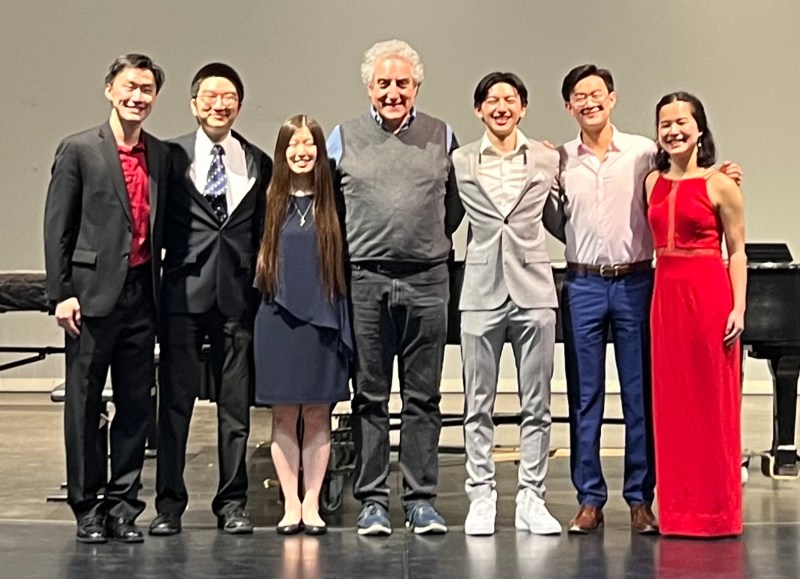The annual Stanford Concerto Competition took place in the Dinkelspiel Auditorium this past Saturday. After nine hours of performances by 33 Stanford students, six contestants — two of whom competed in a duet — were crowned co-winners, more winners than the Concerto Competition has ever seen.
The Stanford Concerto Competition invites current Stanford University undergraduate and graduate students to compete to perform their concertos with the Stanford Symphony Orchestra (SSO) or Stanford Philharmonia (SP). The co-winners of the 2023 Stanford Concerto Competition competed with concertos from a number of different composers. Three of the winning performances will be accompanied by the Philharmonia.
Laura Futamura ’24 on flute performed “Poem” by Charles Tomlinson Griffes for the judges and will be playing with the Philharmonia on Nov. 11, 2023.
Zachary Lin ’26 competed with André Waignein’s “Rhapsody” on the alto saxophone. He will be performing on May 13, 2023.
Daniel Sun ’25 and Jenny Xiong ’24 played the Concerto for Two Flutes in D minor by Franz Doppler and will also be performing their duet on May 13, 2023.
The other two co-winners will be accompanied by the SSO on their concertos.
Richard Cheung ’24 competed with the Johannes Brahms Violin Concerto and is scheduled to perform with the orchestra on Dec. 1 and 2, 2023.
Roger Xia ’24 played Sergei Rachmaninoff’s Piano Concerto No. 2 for the judges and will perform on May 19 and 20, 2023.
Whether each participant performs their concerto with the SSO or Philharmonia depends on the concerto’s instrumentation and how well it fits with each orchestra, according to the event’s guidelines.
Rachmaninoff’s Piano Concerto No. 2 and Brahms’ Violin Concerto are “lengthy, multi-movement works that require a large orchestra,” according to Director of Orchestral Studies Paul Phillips. This was why “they’ve been scheduled with SSO.” The other pieces are comparatively shorter and “better suited for SP, which is a smaller orchestra,” Phillips wrote.
The Stanford Concerto Competition invites judges who are not affiliated with Stanford to determine each year’s winners. This year, both assistant professor of piano studies at Azusa Pacific University Dr. Andrew Park and violinist and violist Eleanor Angel of Santa Cruz came to provide their thoughts on the performances.
In past years of the Concerto Competition, there were usually 2-3 co-winners. However, this year, Phillips said the judges were “so impressed by the ability of those students who were chosen” that he allowed for an increased number of winners this year. “I love giving students this opportunity, so I was glad to make it possible for the increased number of winners this year,” Phillips wrote.
COVID also played a role in Phillips’ decision to allow for 6 co-winners during this year’s competition. In February of 2020, the competition judges selected two co-winners, one of whom wasn’t able to perform due to the COVID lockdown one month later. The co-winner had to wait several years to eventually perform in 2022. The 2021 concerto competition was entirely skipped due to COVID, and the 2022 competition was affected by pandemic safety restrictions.
Fortunately, all concerts afterward were able to proceed as COVID regulations lightened. Even as COVID is still a present issue, the 2023 Concerto Competition was “the first one in three years to be relatively unimpacted by the pandemic and thus we were able to allow more winners than past years,” noted Philips. However, according to him, this will not necessarily hold true for future competitions.
Being able to perform a concerto with the Stanford orchestra was an opportunity that drew a number of the 2023 co-winners to participate in the competition.
Xiong commented that being surrounded by “so many extraordinary musicians” and becoming a co-winner to perform her flute duet with Sun alongside the orchestra was “truly a dream come true.”
A few participants also regularly play in a Stanford music ensemble, meaning they were competing alongside their friends — a process that violinist Cheung appreciated.
“Having attended a lot of other music competitions in the past, this one certainly has [more of] a community feel,” Cheung said. “Everyone is super supportive.”
Pianist Xia echoed similar sentiments: “I really enjoyed learning Rachmaninoff Piano Concerto No. 2 and have always wanted to perform it with an orchestra, especially alongside my friends.”
Enjoying the concerto selected was an important aspect of performing for a number of the co-winners, including flutist Futamura.
“I really love the piece that I played and I just wanted to have that love come across [in] my playing,” she said. “Telling the story of the piece — that’s what I tried to focus on.”
This joy is an aspect of performance that can really come across to the audience — and judges — according to alto saxophonist Lin.
“With music, when you have fun, it shows. The judges want to enjoy the music, but they also want to see that the performer enjoys the music, too,” Lin said, adding that the performer’s passion is reflected in their musicality.
On top of finding appreciation in their own concertos and performance experiences, the co-winners shared a feeling of appreciating their colleagues’ repertoire as well. Flutist Sun makes a playlist of the music played in the Stanford Concerto Competition every year — including this one.
“Participating in the competition and preparing a great piece of music is a rewarding experience regardless of how you end up doing,” Sun wrote. “If there’s a concerto that you really love, you should give the concerto competition a shot!”
